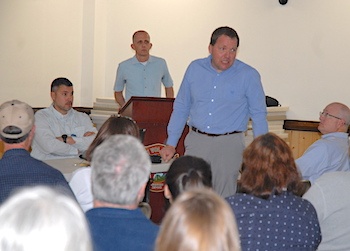
By Randy Arrington
STANLEY, March 9 — A bumpersticker on a truck leaving the public informational meeting Monday night seemed to sum up the feeling of about 115 people leaving the Stanley Fire Hall.
“We all live downstream.”
Local officials and citizens fired dozens of questions at a handful of representatives of Virginia’s Department of Environmental Quality for nearly three hours. They wanted answers about a permit renewal application for the metal recycling plant located in Alma adjacent to the South Fork of the Shenandoah River.
“You don’t have to keep issuing this permit,” said Charles Newton, who serves as one of two Page County representatives on the Shenandoah Valley Soil and Water Conservation District.
For nearly half a century, the Alma plant permit has been renewed every five years to allow the discharge of up to 1 million gallons of treated wastewater into the river. However, there has been no discharge from the site since Pilgrim’s Pride shut down the poultry processing plant located there in September 2002.
“If they are not doing it, why issue a permit?” Luray resident Dawn Ponn asked.
“It’s not uncommon for us to have a permit in place for a site where there is no activity,” DEQ water permits and compliance manager Brandon Kiracofe said. “Sometimes it could be that way for several permit cycles.”
The draft permit would authorize the “discharge of treated stormwater generated from a scrap and waste materials recycling facility where automobile salvage activities also occur,” according to DEQ’s presentation. The draft permit would also “authorize the discharge of poultry processing wastewater, sanitary wastewater, and stormwater from poultry processing plant.”
Currently, the property owner — J.P. Salyards Transportation LLC — disposes of its salvage yard wastewater in lagoons left over from the poultry plant’s operations. The contents are stored on site and not discharged into the river. In fact, owner J.P. Salyards told Page Valley News last month that the discharge pipe was cemented shut years ago.
“We will process the application according to what you would need to meet if you were to build it, but you may never build it,” DEQ regional director Amy Owens told the crowd Monday night. “DEQ doesn’t pass judgement on why someone wants a permit. We simply judge them on the criteria of meeting regulations.”
Salyards took over the permit on Oct. 17, 2008. DEQ reissued the permit to Salyards in 2010 and again in 2015. The owner told PVN last month that he had no intention of upgrading and utilizing the site’s wastewater treatment plant, which he estimated to cost up to $20 million.
Salyards also said he has no plans to sell the property to another poultry operation, which his attorney says is “too small” for anyone to be interested.
However, the salvage yard owner has been selling nutrient credits he earns by not discharging anything from the Alma plant. Under the Chesapeake Bay Watershed Nutrient Credit Exchange Program, Salyards has sold thousands of dollars in phosphorous nutrient credits to the poultry processing plant in Hinton (Rockingham County). The effluent that Hinton discharges flows into Muddy Creek, which flows, eventually, right back into the Shenandoah River and the Chesapeake Bay.
Nutrient credit trading was initially created to clean up the Bay. The theory being to control the total load of pollutants going into the system, while various sites were trying to upgrade and meet standards set in costly regulations. For those who hold unused permits like the Alma plant, a new revenue stream can be found in selling nutrient credits.
This fact was noted and berated by several speakers during the open forum.
“We love local business,” said Kris Garrett of Luray, one of many to compliment the salvage yard Salyard’s runs at the former poultry plant. “But don’t take advantage of the system because you can.”
Page County Board of Supervisors’ Chairman Morgan Phenix clarified the importance of the state agency holding a public hearing on the matter, rather than just an informational meeting — the first is a matter of public record; the latter is not.
“I don’t like the idea of rushing this thing,” Phoenix said. “If you guys put your signature on it — shame on you.”
The permit application process in this case does not require a public hearing, but DEQ has received 103 written requests from local residents to hold one.
“We want a hearing; we want a hearing,” a brief chant started among the crowd.
“We need one,” said Derek Goebel. “We need to be heard. That’s all we ask. That’s why we came out on a Monday night. We want to be heard.”
A decision will be made by the director of the DEQ by May 31. If no public hearing is allowed, then the public comment period will be reopened for written comment to be submitted to DEQ officials prior to a final decision being rendered on the permit application.
“This public meeting is not in lieu of a public hearing,” the regional DEQ director said. “A decision on whether a public hearing will be held has not been made yet.”




The long anticipated hearing/briefing was held last night. The old alma plant has not operated since it’s closure. If is not wanted by the Citizens of Page County then, why the sudden interest in keeping this eye sore open for business by renewing a long dead operating permit. I would hope that we get our Delegate and State Senator to help us get the State to grant us a long overdue public hearing…We all live down stream…